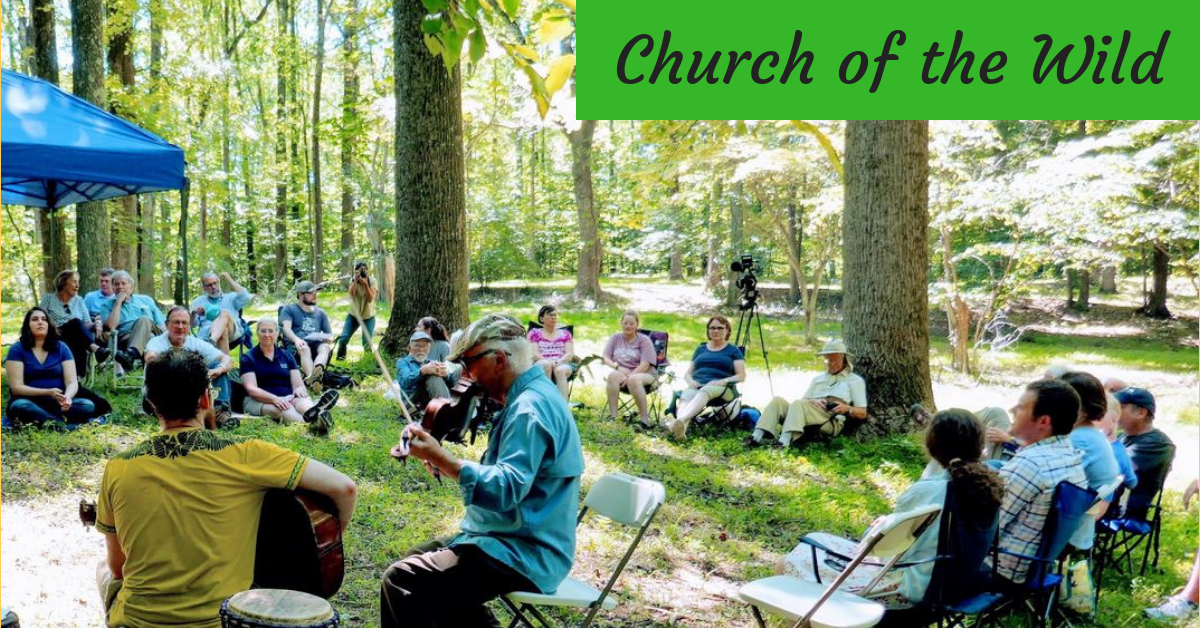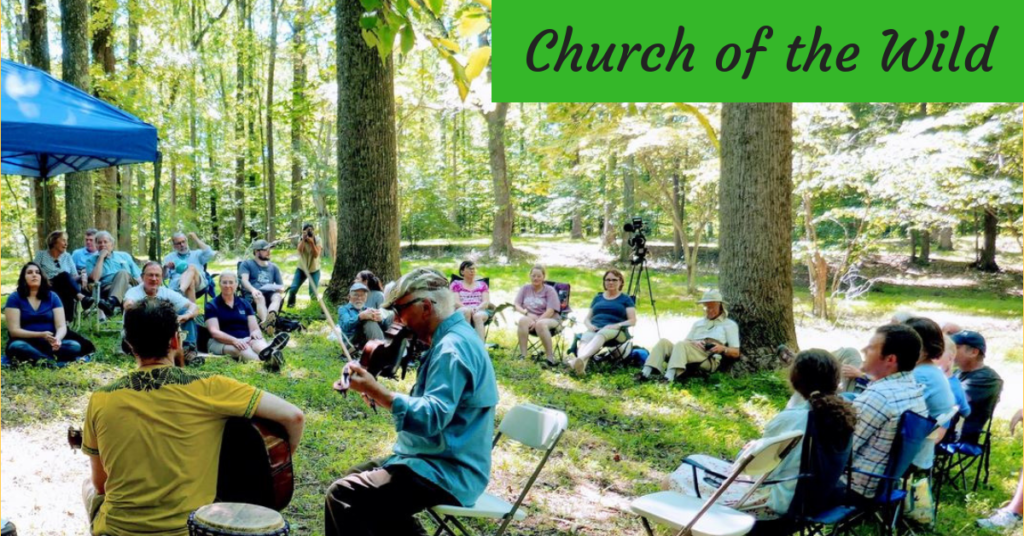Church of the Wild: Thinking and Worshipping Outside the Box

In April of this past year, Church of the Wild was launched. Once a month, the church gathers at a park in the metro area of Washington DC. It is part of the Wild Church Network which consists of 15 outdoor churches from around the United States and Canada. The Spiritual Leader of the church is the Rev. Sarah Anders. She works collaboratively with Beth Norcross who serves as the Executive Director for the Center for Spirituality in Nature. I interviewed both as part of an ongoing series focused on church leaders who are envisioning and bringing to life new ways of being the church with a notable emphasis on creation care and justice.
One of the aims of your church is to honor “the mutual indwelling of the Divine with the Earth and all of its beings.” You have been quoted as saying that the emphasis is on “God as a universal force.” For those accustomed to more traditional “church” language, such theological concepts might seem foreign or hard to grasp. How would you explain this theology and make it come alive for people? How might one understand what this divine, universal force is?
The quote about “God as a universal force” was referring broadly to a dictionary definition of universal and source: universal as accessible to all, and force as an energy that moves in, through, and around us. We recognize God as a ubiquitous presence, an accessible, mysterious force that energizes all of creation, giving us life and being.
In bringing this into more conventional understanding, we can start with Exodus 3, where Moses famously encounters God in the burning bush. The great “I am,” “the God of Abraham, Isaac, and Jacob” comes to Moses, basically, through a shrub. And, John 1:3 affirms that the Word is integrated, from the time of creation itself, in all aspects of the created world: “Through God all things were made; without God nothing was made that has been made.” Christ is above, beyond, and within the creation. It is not surprising then that people tell us repeatedly that they find themselves closest to God, and to all of God’s creatures, when in the natural world.
At Church of the Wild, we are hoping to help participants open themselves to the essence of God that is within the created world. Importantly, this experience is open to both traditional church-goers and to those for whom church is no longer, or never was, a place to have this experience. Before we launched Church of the Wild, we held two listening sessions, and then followed up with a survey. We found that people who are members of a regular faith community as well as people of no faith community are longing to discover and experience God in nature.
Our theology comes alive in the experience itself. Instead of a sermon, we offer a guided meditation followed by a 20 minute walk in silence. Attuning ourselves with nature opens us to an experience of non-duality: God, us, and creation as One, not separate, rather than a subject-object relationship. Cynthia Bourgeault, the Episcopal Priest and mystic, reminds us that loving our neighbor as ourselves is often interpreted as an instruction to love our neighbor as much as we love ourselves. Actually, she says, Jesus was asking us to love our neighbor as ourselves, because our neighbors are, indeed, ourselves. We are all One. Spending attentive time with our neighbors, the fern, the tree, and the hawk, we are reminded of our profound interconnection. A shift in consciousness emerges that moves us to live and work on behalf of all beings.
I am curious about the Wild Church Network which consists of 15 outdoor churches. This would seem to be a budding church movement. What do you see as the central factors behind this? Would you see the factors in terms “push-pull” dynamics whereby people are being pushed away from traditional church models for various reasons while being drawn to the alternative offerings of the Wild Church model?
The Wild Church Network is reflective of an emerging desire from both traditional church go-ers and the unchurched to “do” church in a new way. They’re yearning for something more than they’re getting in traditional churches. Our sense is that the something more is a deep, direct, unmediated experience of the Divine. Participants might or might not view Wild Church as a replacement for their church home. It’s too early to tell. For now, for many, it seems to be a supplement to their church home. Those without a faith community come to Wild Church for a community where the outdoors and spiritual practice come together. There are some for whom Wild Church is a community that doesn’t carry the baggage of “The Church,” which in the past has kept them from attending spiritual gatherings.
Each of the communities in the network has their own way of gathering. Some of the churches in our network hold a worship service akin to a traditional church service, but it is held outdoors. For others, it is an outdoor gathering with less traditional worship elements: contemplation, non-amplified music, readings, and wanderings.
The Center for Spirituality in Nature has created its own guide for helping people start a Spirituality in Nature Group (SING). The guide mentions how studies show that time in nature helps foster empathy and compassion. If we think of justice as the public expression of love, do you think that communities like Church of the Wild can be places that nurture efforts to challenge and actively address societal wrongs? Tell me about whether and how you see Church of the Wild in relationship to justice, activism, etc.
We feel very strongly that this ministry is absolutely integrated with activism for a just and healthy planet. There is no doubt that the unraveling of our planetary systems is already having the most profound impact on the poor and marginalized. Both of us have been engaged in specific activist activities over the years related to the environment and environmental justice in particular. Beth comes out of the environmental community and has recently stepped down as chair of Interfaith Power and Light DMV, an activist organization dedicated to lowering the energy use of local congregations.
Through these activities, we engaged with many fine people within the faith community working on eco-justice issues. Our new ministry contributes to this work by developing a new way of looking at an actively loving, just community that understands the inextricable bonds between its human and non-human members, and our lives and lifestyles.
At Church of the Wild, we start at a different place. We first provide an opportunity to form relationship with our sacred landscapes and the creatures and plants that share them with us. We open up space for an experience of God present within each element of our home ecosystems, including ourselves. As such, we encourage a “spiritual activism” rooted in first opening ourselves to God’s desires for each of us and for God’s beloved creation. As this relationship deepens, we can look with clear eyes and open hearts at how our lives and lifestyles affect our human and non-human neighbors and then transform our behaviors accordingly.
Our theory of change is that this groundedness guides us to live our lives from a place of deep compassion, care, and gratitude for all living things, particularly those who are most vulnerable and bear the most significant impacts of our ecological crisis. We encourage and support regular spiritual deepening in nature which in turn gives us the resilience, inspiration, guidance, and courage for the hard work of acting for justice for all beings.
Related News
Joy, Love, and Climate Action: A Church Draws from Ayana Elizabeth Johnson
At First Congregational Church, UCC, in Colorado Springs, CO, our Climate Justice Leadership...
Read MoreAn ally experiences PRIDE in the CLE
Advocacy and Action for Women's and Gender Justice Local events stir thoughts and...
Read MoreVote for Climate Hope Congregation Toolkit
After having witnessed the wonderful Climate Hope art of UCC children and youth, we are now...
Read More

